COVER- Gone South (by Southwest)
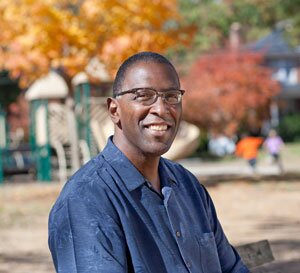
"The film really started out as a story about me," says World Peace Game creator and teacher John Hunter. "But the more I watch it, the more I surreally seem to disappear. I make a gesture, and it's my mother's gesture. I see this lineage of teachers coming through a transport vehicle, a conduit, really. I disappear, and the legacy of the good teachers I've had is what I see."
PHOTO BY WILL MAY
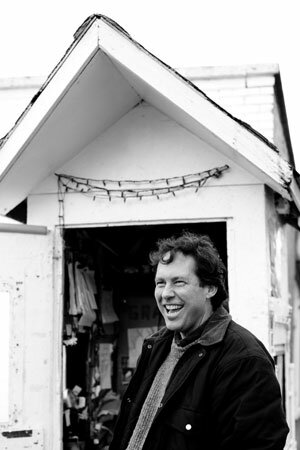
Corner Parking Lot owner Chris Farina is a filmmaker whose credits include Route 40 and West Main Street, in addition to World Peace and Other 4th-grade Achievements.
PHOTO BY JEN FARIELLO

Nash Davis and Cody Smith play the World Peace Game.
PHOTO BY WILL MAY
What do a class of sweet-faced fourth graders and a bunch of gritty parking lot attendants have in common? Well, to start, each is the subject of a Charlottesville film that will premiere at the South by Southwest Festival in Austin in March. But those shared accomplishments aren't their only commonality; both films find philosophers in unexpected places. And the director of one of the films, World Peace and other Fourth Grade Achievements, also happens to be a star of the other, The Parking Lot Movie.
A longtime filmmaker whose friends describe him as either "the nicest guy ever" or "so nice it's not even funny," Chris Farina says his head is spinning over the success of both films.
"The fact that we've gone to a national stage is really wonderful," he says with his nearly ever-present grin, noting that without festival exposure, independent films have little chance of finding distribution and reaching broader audiences.
"It's really impressive," says Barry Sisson, producer of the indie smash hit The Station Agent, adding he was "shocked" to hear that two Charlottesville films had been accepted into South By Southwest, "an up-and-coming, respectable festival that's hard to get into."
Indeed, only 130 of the 1,572 feature films submitted for this year's festival were invited to screen, according to Festival publicist Rebecca Feferman.
Even with such a prominent stage, Farina doesn't expect World Peace to swell his bank account to James Cameron proportions.
"There's no hope of a profit," he says, still grinning. "Some films, yeah, this film, no. It's really designed for PBS. The only thing you're hoping is to get underwriting support and to get paid a salary while you're doing it."
He says he just hopes to break even on the film's estimated $120,000 budget.
"You don't make film to make money," he says, his expression suddenly serious. "You make it because you believe in film making; you want to move someone emotionally."
The film's genesis came nearly five years ago when Farina was emotionally moved upon meeting teacher John Hunter, creator of the film's eponymous game, which places children in positions of power over fictional countries and presents a series of complex problems from food shortages to economic turmoil that they must resolve in order to win the game by achieving world peace.
"He's a really wonderful individual," says Farina. "He's got this Buddhist sense to him, and it's real."
A second generation teacher who grew up in the segregated schools of Richmond in the 1960s, and who was part of the first wave to integrate, Hunter was fascinated early in his life by cultural differences and conflict resolution. During a several-year hiatus from college in the early 1970s, he traveled extensively through southeast Asia, absorbing the teachings of yogis and Gandhi before returning to complete a teaching degree at Virginia Commonwealth University. When he took his first teaching job at the alternative public Richmond Community High in 1978, Hunter says, he wanted to "make things more engaging than book learning."
That's when he came up with the World Peace Game. Although the original version of the board game used real countries, Hunter says he soon switched to fictional nations to allow students more range.
"As complex as the real world is, their imaginations are much more powerful," he says. With help from his father, he built a three dimensional version of the game using transparent plexiglass representing sea, land, and air.
Although the game started at the high school level, he says it required little adaptation to teach it to younger children– and he says their ability to problem solve and cooperate, even at age 9, continues to amaze him.
"I never tell or give advice," he says. "I don't know the answers– there are infinite variables. They have to dig deep to come up with something that will work."
While the ultimate goal of the game is world peace, there are conflicts– and even fictional bloodshed– along the way, just as there is in the real world. If troops are lost, students write letters to the fictional bereaved families, explaining the loss and why it was necessary.
Even nuclear war is possible in the game, although Hunter notes that despite several threats, it has never happened. Should it occur, everybody on the continent– regardless of whether they were aggressor or victim– will lose half their resources.
"I have to surrender to that possibility," he says. "It's no longer my game, it's their game. "
Farina's film follows eight weeks of Hunter's 2006-07 class of fourth-graders at Charlottesville's Venable Elementary (though Hunter has since moved to Albemarle County's Agnor Hurt Elementary.)
Farina's directorial style delighted Hunter.
"His quiet approach suited perfectly my contemplative background," says Hunter. "He's able to take a huge amount of chaos and complexity and frame it in such a way you can see subtle threads."
Indeed, the film moves seamlessly between busy classroom scenes and Hunter's musings on teaching and his recollections of his childhood and youthful travels. Scenes of heated debate between impassioned children over allocation of resources and possible treaties are interspersed with Hunter reading quotes from ancient Chinese warrior-philosopher Sun Tzu, offering a sense of the timelessness of human conflict.
Farina believes Hunter's game just might help the next generation get a bit further along than the previous hundreds of generations have managed, and he'd like to see the film help bring the game into schools not just across America but around the world.
"There is a mission– to spread John's influence, to replicate the World Peace Game, to get people to think about what and how we're teaching our children," says Farina, the smile back on his face.
~
A sneak preview of World Peace and Other Fourth Grade Achievements takes place at the Paramount Theatre on Sunday, February 21 at 6pm.
#
The Parking Lot Movie
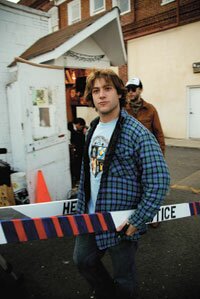
Attendant Corey Gross carries the ever-changing poetic lot gates
PHOTO BY WILL MAY
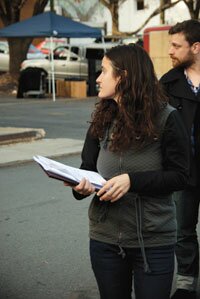
"My intention was to make people forget about the camera. I wanted as much transparency as possible," says The Parking Lot Movie Director Meghan Eckman. "It helped that I'm one person with a camera; it helps people open up and be themselves."
PHOTO BY WILL MAY
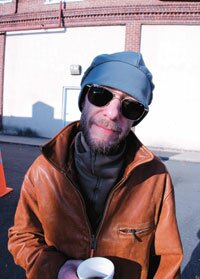
Could any of the parkers skewered in the film be angry? "Definitely," says Assistant Director Chris Hlad. "But let's hope people can laugh at themselves and not take it so seriously that they can't see some of the truth, some of the comedy in it. We'll see how it's received."
PHOTO BY ALEXANDRA MILLER
If you've ever been to the Corner, chances are you've parked in the Corner Parking Lot. Chances are also good that when you pulled into that spot or paid your parking fare, you had no idea you were in the company of serious philosophers, musicians, artists, and– now– future film stars. The Parking Lot Movie may change all that.
Director Meghan Eckman, a 2000 UVA grad, had just returned from several years living and working in Brooklyn in 2006, when a friend recommended she make a film about the Lot, which has been operated by World Peace director Chris Farina since 1986, and which has a preternaturally loyal stable of attendants who see the job as more of an existential experience than a low-brow way to pay the bills.
"I came to the parking lot and hit 'record,'" says Eckman. "What happened was an explosion."
While the unemployed director initially thought she'd be shooting a 10-minute short, "It became so much more complex. It became about culture, car culture, comedic qualities," she says. "It's absurd, they're so fanatical about the rules of parking and parking lot justice."
And yet, despite the absurdity– or, perhaps because of it– she says she recognized "this element of truth." As the subtitle says, "It's not just a parking lot. It's a battle with humanity."
"This is a celebration of what I love about Charlottesville," says Eckman. "It's a celebration of this space where people take time to hang out. There's a convergence in the community. You get a lot of mixing of characters and culture. People from all different walks of life meet there."
Interviews with current and past attendants– whose somewhat stunning career accomplishments aren't revealed until later– are interspersed with vignettes of life in and around the ramshackle parking lot booth. The lot, tucked along the railroad tracks behind several Corner restaurants, provides the backdrop for what might be seen as mind-numbing work: it's a job that consists solely of directing cars into spots and making change. It's a job that also breeds contempt among the attendants for certain types of parkers– those in massive SUVs, for instance, and those who attempt to pay less than they owe– even if it's as little as 40 cents, an amount that still rankles former attendant James McNew, now the bass player for the successful rock band Yo La Tengo.
While there have occasionally been female attendants, the vast majority are male– and Eckman believes gender has played a role in the elevation of the Corner Parking Lot from meaningless swath of pavement to temple of higher thought.
"I find this kind of fanaticism, this kind of aggression, is more exemplified by the men who work there," she says, recalling scenes in which attendants verbally spar with– and even chase down– drivers who have broken the spoken or unspoken rules of the lot.
One year into the three-year project, Eckman was joined by poet Chris Hlad, a friend of numerous attendants, who became the film's assistant director.
"We edit side by side, and it's great to have feedback with two people editing," notes Eckman. "He's helped me streamline and find a story that's compelling."
Although his appearances in the film are short, lot owner Chris Farina is a central character and the man who sets the tone of the lot for the attendants. Here, Farina notes on film, customers don't come first– the attendants do.
"To me, it's all about how you treat your employees, and the customers are kind of an after thought," he says. "I mean, the customers are cars."
For Farina, becoming the subject of a film was a first.
"I didn't want to tell her how to do it," says Farina, noting that he has yet to watch the film but is looking forward to seeing how Eckman and Hlad have interpreted the place that's been a large part of his life for nearly 25 years.
Charlottesville-based film producer Barry Sisson, unconnected to this project, says he plans to be among the first to see it.
"I've been fascinated by the concept since I first heard about it," says Sisson, noting that acceptance to South by Southwest means "it's going to be good."
~
Local audiences– parkers and non-parkers alike– will have a chance to see the film at least twice. Its Charlottesville premiere is scheduled for March 27 at 8pm at the Paramount Theatre, and it screens again at UVA's Newcomb Hall on April 10 at 6pm as part of the Student Film Festival.
#